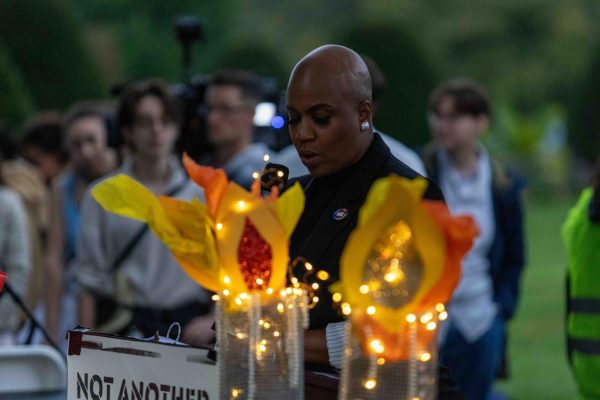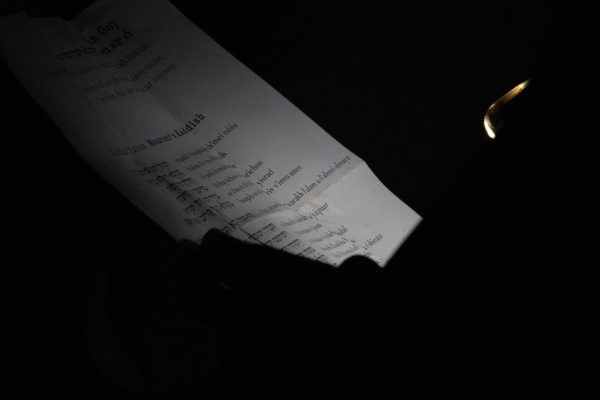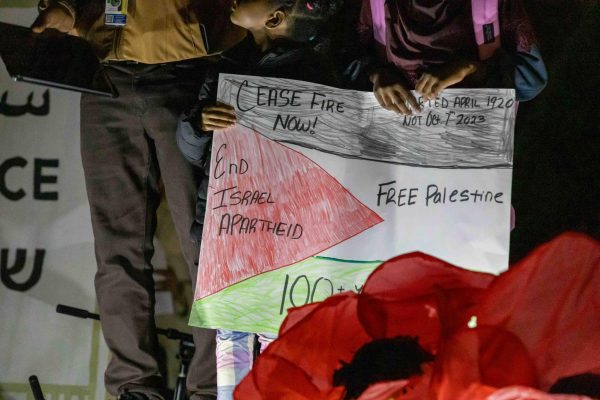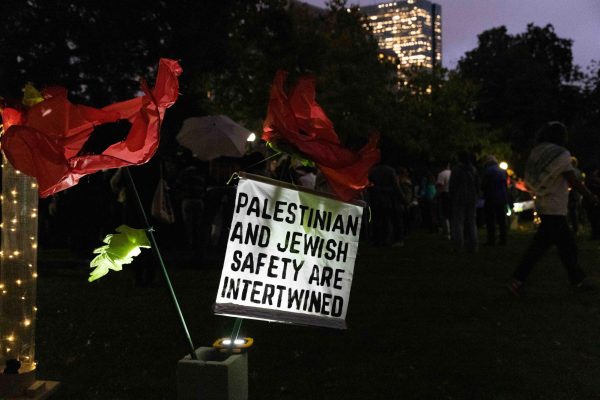A crowd of keffiyehs and yamakas filled the Boston Public Garden Monday as part of a joint memorial service for the Israeli and Palestinian lives lost since Oct. 7 last year.
The event, put on by IfNotNow, aimed to create a shared space to “mourn the dead” and “fight for the living,” while calling for a ceasefire in Gaza.
IfNotNow is an organization led by American Jews that seeks equality and justice for Israelis and Palestinians through a series of social movements and events across the East Coast.
Nearly 300 people gathered in the Garden for Boston’s memorial, while IfNotNow memorials also took place in Chicago, Los Angeles, New York, Philadelphia, and Washington, D.C.
“Our hearts are big enough to grieve for every life lost,” the first speaker said. “Jews cannot be safe if Palestinians are not free.”
The event organizers offered various avenues of support to attendees during the night. Resources included ACLU marshals for safety and a tent for anyone needing to talk to someone or have a moment of silence.
Event organizers invited MA. Rep. Ayanna Pressley, who voiced support for Emerson’s encampment, onto the stage to talk about Boston’s ceasefire approval and her work as a congresswoman.

“Good evening movement family,” she started. “And I mean that when I say family. We’re all here because we recognize, as one human family, that our destinies are tied.”
Pressley acknowledged the approximately 1,200 Israelis who were killed on Oct. 7 and the nearly 41,900 Palestinians who have been killed as a result of the war between Israel-Hamas that followed the attacks.
Policymakers, she said, “have a moral, humanitarian, and righteous mandate to save lives.”
“Every action taken by policymakers, from Congress to the White House to the Knesset, should be in pursuit of de-escalation, saving lives, and preventing a broader regional war,” she continued. “We need a permanent ceasefire now.”
Pressley spoke to reporters about the reason she came to speak on “this solemn day.”
“I’m here today in solidarity. In Judaism, they say every life is a universe,” Pressley said. “I just keep thinking about the many universes that we’ve been robbed of.”
Pressley said she hopes for an arms embargo that would put an end to the bombings happening in Israel and Gaza. Pressley also noted that you can’t just pray for peace, but it’s something to work towards.
“We have to engage every diplomatic tool available to us for a permanent ceasefire and we have got to stop sending bombs. The path to peace is diplomacy,” said Pressley. “When we did have a ceasefire, that was when some hostages were returned to their families.”
Following Pressley’s speech, attendees were encouraged to talk to those around them: introduce themselves and learn more about why everyone was there.
Rakia, a community member, shared their personal experience of losing friends in the wake of Oct. 7.
“In some nauseating combination of sheer panic and shock, I texted my family in Israel to tell them that I love them,” they began, recounting last Oct. 7. “With an additional anticipatory dread, a deep knowing of how Israel would respond to this attack, I texted my friend who lives in Gaza to tell him that I love him.”
Soon after the attacks, their family in Israel was called into military service. Their friends in Gaza later died, they said.
“I remind myself that their legacy will not end with his family’s death because we are here,” they said. “My family’s safety will not be perpetually at risk because we are here. We whose grief is indiscriminate, we who have lost Palestinian and Israeli loved ones, we who feel indescribable fear, anger, and anguish, we are here to say that the violence must end.”
Following the testimony, another speaker introduced the Hebrew practice of Kriah, which means “to tear” or “to rend.” Pieces of fabric were passed out to the crowd, the speaker encouraging attendees to tear their fabric following a group reading of the Mourner’s Kaddish, a traditional Jewish prayer for those who have died.

“This prayer calls for life and blessing amidst unspeakable pain,” they explained. “By saying Kaddish, we acknowledge that every life magnetizes the name and face of the Divine. Every life a universe, every life an expression of the Divine.”
Following the Kriah, one of the speakers introduced Rabbi Toba Spitzer from Newton to share a prayer with the crowd. Spitzer read excerpts of a speech from Yonatan Zeigen, the son of peace activist Vivian Silver, which he shared at Silver’s funeral.
“We all need to realize that the occupation, the 7th of October, the war in Gaza, Jewish and Arab terrorism, and any kind of political violence are not inevitable,” said Spitzer. “They are based on false and toxic ideas that bring and will continue to bring destruction on us all.”
Following this, Spitzer shared a prayer written by her colleague Rabbi Sharon Cohen Anisfeld, asking attendees to stand.
“Shelter those who witnessed unspeakable brutality and whose walls could not protect them, carry those who were caught or cornered, unable to escape destruction, degradation, despair,” Spitzer read. “Lift up those who searched for sustenance or safety, longing for the embrace of home.”
Following the prayer, Maya, a solidarity activist in both Israel and Gaza, spoke to the crowd about a fellow activist named Chaim, who died a year ago.
“In his solidarity work, Chaim witnessed and amplified the power within us—within our movement—to overcome oppression. In his academic work, Chaim witnessed against the powers within us that cause harm or that lead to failure,” Maya said.
“In honor of his legacy I call on us to do the same,” Maya continued.
Following Maya’s speech, Reem, a Lebanese resident living in Boston, spoke about their family living in Lebanon. Israel’s latest bombing campaign in Lebanon has killed more than 1,400 people.
“I’m so tired of calling my mom, begging her to tell me that everything will be alright, that my family in Lebanon will stay alive,” Reem said. “That our family-owned restaurant will not get shut down, that the house my family has had for generations, the house my great grandfather built himself won’t get bombed.”
They advocated for the crowd to talk to any Lebanese or Arab person they know, saying that they are likely not doing well.
“The violence is circling in the air like a tornado, the bunker bombs detonating the stories of our homeland,” Reem said. “It must come to an end.”
Sharing stories about shopping at local Lebanese grocery stores or making Turkish coffee, Reem said they do “anything I can to feel that I am with my family, that I have not abandoned them by living in this genocidal country.”
In an interview with The Beacon, Reem said the organizers took “a lot of time and energy to put together a very communal gathering.”
“Everybody is welcome here,” Reem said. “We do not turn away anybody. We believe in peace. We believe in a ceasefire. And I’m here today because I strongly believe in that message.”

The final speaker of the event was Ahmad Berry, the imam and community liaison of the Boston Islamic Interfaith Society (BIIS). BIIS’s goal is to “empower Boston’s youth, nurture interfaith understanding, and create a safe space where individuals can grow academically, morally, and spiritually,” according to their website.
Berry said that in Senegal, where he is from, “everybody looks the same” but each person there comes from different religious backgrounds.
“We live together, we marry each other, we live peacefully,” Berry said. “And this is what God the Almighty wants from us.”
Berry quoted sections of the Quran throughout his speech, using them as evidence to support the notion that the Israel-Gaza conflict should end in nothing but peace.
“We have the ability to bring peace and the ability to stop those who are against peace,” Berry said. “And God continues to say those who do good will receive an everlasting reward in the hereafter life.”
“It’s a day of mourning. So many lives were taken on this day, innocent lives,” Berry said in an interview alongside his colleague Robert Novak, BIIS’s chief of technology. “We are here to show support to our brothers and sisters in faith … unity is important … and as Muslims, we are against the taking lives of anyone.”
Novak commented on how the U.S. government is responsible for the conflict’s death toll.
“Our taxpayer dollars are paying for bloodshed, not just here, but around the world,” Novak said. “The futures of brilliant people are being sacrificed just because of their political agendas.”
Novak also said that cities like Boston are key to unifying communities affected by the conflict.
“Boston is a city of progress; what we do here in Boston is seen around the world. We are a city of education, of stability and equality,” he shared. “We need to say that the life of one person is equal to the life of another person. Nobody is an animal and we can’t treat people as if they’re savages.”
The vigil ended as a young participant named Cosmo took the stage to blow a shofar—an instrument made from a ram’s horn. The instrument is traditionally played during Rosh Hashanah services. After the horn was played, attendees were invited to stay and connect with each other.
Elizabeth Weinbloom, a member of IfNotNow’s communication team, highlighted the importance of this service in an interview with The Beacon.

“We’re on the side of civilians and we’re on the side of regular people who know that Jewish safety and Palestinian safety are deeply entwined with one another,” Weinbloom said. “Jews will never be safe until Palestinians are free and safe. There’s many out there who want to turn this into a Jews versus Palestinians, and it’s not.”